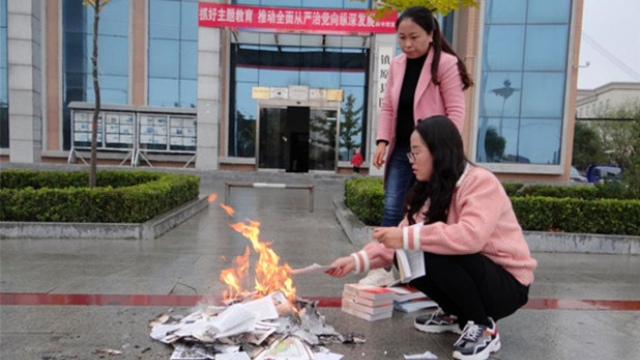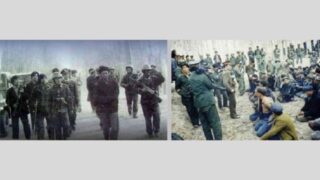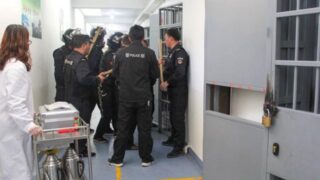Images of books removed from libraries in China and publicly burned evoke disturbing reminiscences of the Nazi campaign of 1933.
by Massimo Introvigne


In 1933, the Nazi Party in Germany launched its infamous book burning campaign. Thousands of books regarded as “Jewish,” “un-German,” or against the Nazi Party were removed from libraries and publicly burned. Although the Nazi regime was also responsible of worse atrocities, the images of the books burned in 1933 remain in the collective memory of Europe, as a reminder that those who start by burning books one day will also burn human beings, in Auschwitz and elsewhere.
The story is now repeating itself in China. Last week, social media circulated the image, taken from local CCP newspapers, of books burned in front of the county library of Zhenyuan county, in Gansu province. The CCP newspapers commented that, “The library has completely cleaned and quickly destroyed illegal books, religious publications, and especially books and articles with biases.” Zhenjuan country is in an area with a sizeable presence of Hui Muslims, and it seems probable that at least some of the burned “religious publications” may be Islamic books.
Comments on social media in China (most of them, in the popular Chinese platform Weibo, later removed by the authorities) noted that books were also burned during the Cultural Revolution and many referred to the Chinese expression “burning of books and burying of scholars” (焚書坑儒), used to designate the infamous burning of texts in 213 BCE, followed by the live burial of 460 Confucian scholars in 212 BCE, by emperor Qin Shi Huang (秦始皇, 259-210 BCE), the founder of the Qin dynasty.
Reportedly, what happened in Zhenyuan county is not an isolated incident. It follows instructions sent in October 2019 by the Ministry of Education to school libraries all over China to remove and destroy books “that damage the unity of the country, or the sovereignty or its territory; books that upset society’s order and damage societal stability; books that violate the [Communist] Party’s guidelines and policies, smear or defame the Party, the country’s leaders and heroes.”
The public outcry elicited a statement by the Zhenjuan county government, claiming that, “The employees did not seal and collectively destroy [the books] according to regulations, but rather burned the 65 illegal books in the small plaza in front of the library,” and that those responsible would be “held accountable.” Interestingly, the statement did not deny that the “illegal” books should have been destroyed, and only comments that it was unwise to burn them in the open, where somebody could take pictures.









